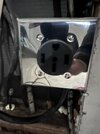ATPMSD
Active Member
currently the code just says something about GFCI breakers being required for outlets installed for the purpose of charging EVs
Actually it is required for all outlets in a garage and on the exterior of houses. So I guess they heard you!
210.8(A) GFCI Protection for Personnel Dwelling Units…”Bathrooms, Garages and Accessory Buildings, Outdoors, Crawl Spaces, Basements, Kitchens, Sinks, Boathouses, Bathtubs and Shower Stalls, Laundry Areas, Indoor Damp and Wet Locations.”



